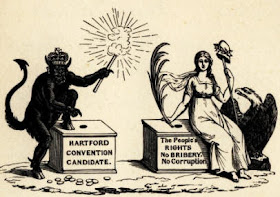Monday, November 28, 2011
Hartford Convention-1814
The Hartford Convention was an event during the War of 1812 in which New England's opposition to the war reached its peak. Thomas Jefferson's anti-foreign trade policies, particularly the Embargo Act of 1807 and James Madison's Non-Intercourse Act of 1809, were very unpopular in the northeast. Jefferson's successor, President James Madison, was even less popular in New England, particularly after his prosecution of the War of 1812, which ended legal trade with England. The opposing Federalist Party regained strength especially in New England, and the Hartford Convention was held do discuss possible succession. This is a clear example of sectionalism in the United States government. The two political parties at the time were the Republicans and the Federalists. Since the Federalists were located mainly in New England, the blockage of commerce was severely affecting them. They held the Hartford Convention in hopes to possibly break away from the rest of the country because they felt betrayed and disrespected by the loss of trade due to the Republican's incessant war cries. The mere fact that the Federalists wanted secession clearly shows a split in the United States government, that being "Republicans vs. Federalists."
